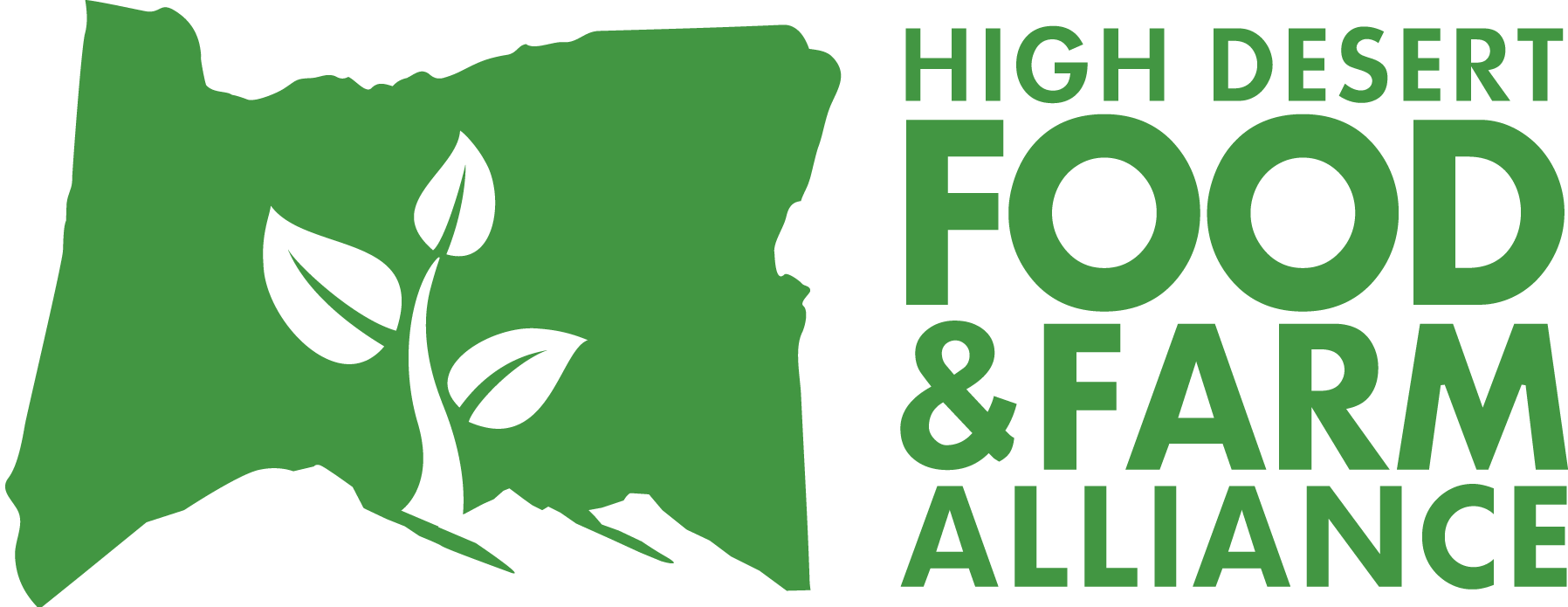Advocacy & Policy
Advocacy and Policy at HDFFA
As an alliance of Central Oregon farmers, ranchers, and food businesses, we understand how policies impact our partners’ ability to grow, raise, and craft food for our local communities. Policies have major implications from land use permits to water rights to processing bottlenecks. HDFFA advocates on behalf of small-scale producers to make sure we are fighting for legislation that makes farming a viable option in Central Oregon.
We work on local and state level policies and with multiple organizations including Friends of Family Farms,Oregon Community Food Systems Network, and Oregon Food Bank to use our collective voice to speak on behalf our constiuents.
Does Local Policy Matter?
Yes! Local policies affect the institutions and programs that we use on a daily basis. From infrastructure to education, local decisions can have a huge impact on our economies and quality of life. For farmers, ranchers, food producers, and consumers, policies focused on labor market rules, taxes, environmental regulations, and zoning rules all have a significant impact on the availability of the local foods that we love.
Local Issues
Click on the icon below to learn more.
The challenge:
Ranchers raising livestock for local consumption are increasingly faced with bottlenecks at the slaughtering and butchering stage of their operation. To sell their meat at farmers markets, grocery stores, or direct to consumer (not including meat shares), they must go through a USDA-inspected facility. Central Oregon has two USDA-inspected processors (Butcher Boys in Prineville and Oregon Beef in Madras), which means ranchers booking slaughter dates must schedule out 6 months to 2 years in advance – a difficult task for small ranchers facing many unknowns.
As consolidation in the meat industry continues, we expect to see more closures of small and mid-sized meat processing plants, but we are working on solutions to the issue.
What we’ve done so far:
- HDFFA serves on Oregon Department of Agriculture’s (ODA) Meat Industry Stakeholder Working Group, helping ODA understand the constraints on the industry and proposing solutions.
- HDFFA’s Agricultural Advisory Committee signed a letter in support of House Bill 2785, which passed in the 2021 Legislative Session, which allocates $2 million in grant funds for processors to improve, expand and/or construct meat processing facilities to meet new State Meat Processing Inspection standards, or expand currently USDA-inspected facilities.
The challenge:
Land use laws and permitting processes at the county level can have large impacts on small-scale farmers and ranchers. A majority of our partners are on Exclusive Farm Use (EFU) zoned land, which has defined parameters for what landowners can and cannot do with the land. EFU laws were put into place to protect agricultural lands, which HDFFA fullheartedly supports, but as the farming industry evolves and our producers respond to a changing business and environmental landscape, high permitting costs, long wait times, and stringent rules make it hard for producers to remain agile with their operations.
While a majority of land use policy is housed at the state level, counties and their Commissioners have some flexibility in how they enforce the code and what fees they charge. We are working with our partners to determine solutions and to change the policies that are not currently working.
What we’ve done so far:
- We reached out and listened to farmers/ranchers who had worked with Deschutes County Planners to better understand the barriers they faced working with the county. With this feedback, we drafted a letter to the County Planning Commission to identify three main barriers to improving rural economic development for small-scale farmers: agritourism, temporary labor housing, and meat processing.
- Based on this letter and numerous responses from farmers and ranchers, the Deschutes County Planning Commission invited HDFFA Executive Director, Katrina Van Dis, to speak on a panel to the planning commissioners on why small-scale agriculture is important and what they could do to help. See a recorded session of the panel here.
- Following this discussion, the County Planning Staff developed a matrix of solutions that could be solved at the county and state level. They invited HDFFA and our Partner producers’ to speak to the Planning Commission to determine solutions that will be brought to the Board of Commissioners.
The challenge:
Oregon’s antiquated water laws (established in the early 1900s) such as the prior appropriation doctrine, coupled with aridification of the region, result in unequal distribution of irrigation rights. This results in some farmers and ranchers not having enough water to operate and having to fallow their fields, and some producers having so much water that they use it in wasteful ways.
While there are big forces at play protecting current water law, we will continue to advocate for small-scale farmers and ranchers growing food for their communities, who need enough water to continue to produce.
What we’ve done so far:
- In August 2021, we organized a panel of water experts to discuss the current issues surrounding small farmers and ranchers in terms of access to irrigation. Panelists included Phil Chang, Commissioner of Deschutes County, Kate Fitzpatrick – Executive Director of Deschutes River Conservancy, Shon Rae – Deputy Managing Director of Central Oregon Irrigation District, Todd Peplin – Deschutes Soil and Water Conservation District Programs Leads, and Mike Britton – North Unit Irrigation District General Manager. See a recording of the panel here.
- We participate on the monthly irrigation district downloads held by the Deschutes Basin Board of Control and sit in on the Deschutes Basin Water Collaborative to make sure the voices of small-scale farmers and ranchers are heard at these meetings.
The challenge:
Year after year, farmers and ranchers in Central Oregon are burdened by sudden shocks to their operations, such as: market disruptions (covid-19) to environmental challenges like hailstorms, drought, and wildfires. Consistent years of these challenges can put debilitating strains on farms and ranches. While some Federal aid is available, many of our producers do not qualify for a variety of reasons. Investing in short-term support for farmers and ranchers experiencing these stresses allows them to stay viable while they adapt and prepare for future challenges.
We worked with the Oregon Community Food Systems Network’s (OCFSN) Farming for the Future group to create a grant fund for small-scale and BIPOC+ farmers and ranchers to access after a significant disaster resulting in on-farm losses.
What we’ve done so far:
- Wrote a letter of support to Oregon state senators, state representatives, and the governor asking them to allocate a portion of the $150,000,000 in funds in Section 167 of House Bill 5006 for natural disaster relief to be allocated to small-scale producers to weather the current extreme drought faced by Central Oregon producers. We collected over 75 signatures from community members for this letter. See letter here.
- HDFFA, OCFSN, and a number of producers from across the state sat on a panel with representatives from the Oregon Department of Agriculture and the Governor’s Office of Natural Resources to hear about the impacts of the drought and determine solutions. HDFFA collected testimony from three producers in Central Oregon and you can read those here.
Policy Basics
Policy – are courses or principles of action adopted or proposed by a government, party, business, or individual. An example in Central Oregon would be policies around land and water usage.
Advocacy – is promoting an idea or cause through education, outreach, and organizing. An example in Central Oregon would be sharing a letter with your county commissioner about your experience with food insecurity.
Legislature – is an assembly with the power to make laws for their city/state/nation. In Oregon, the state legislature is made up of 60 representatives and 30 senators.
Find your representative and senator here and view upcoming Legislative meetings here!
We welcome your feedback, comments, or suggestions at info@hdffa.org




